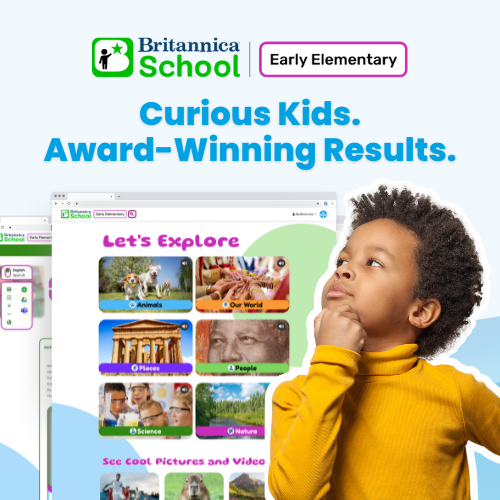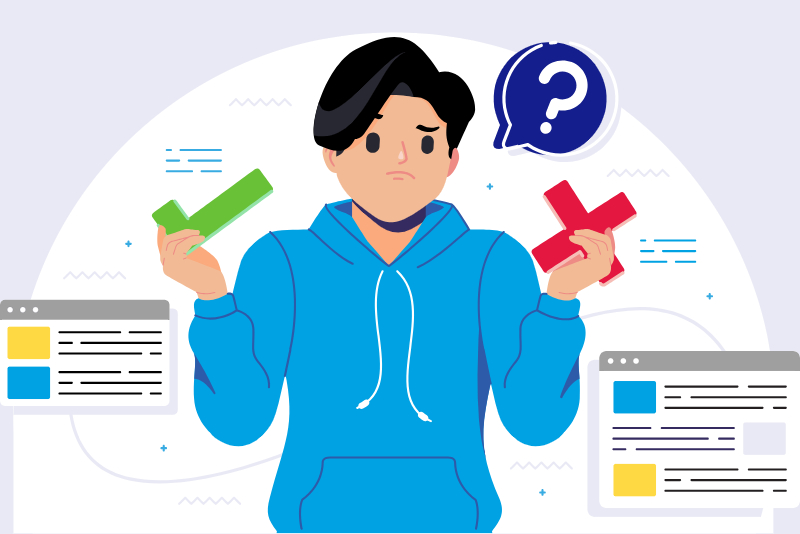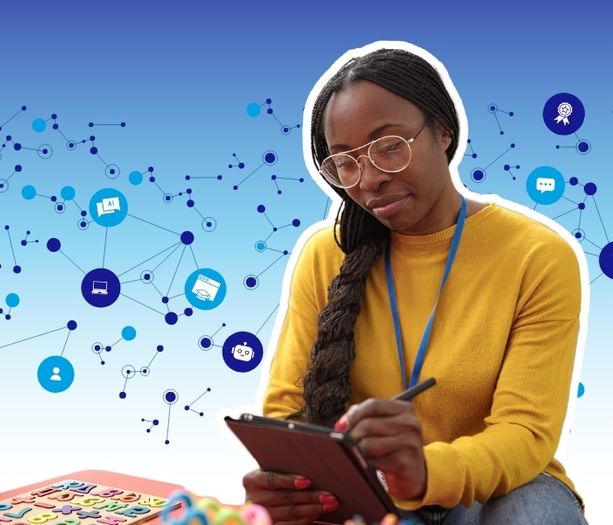
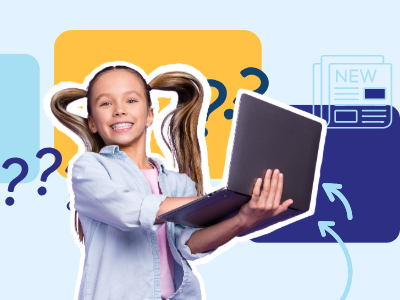
Table Of Contents
Almost two-thirds of adults say they never learned how to critically analyze media in school,1 and the outlook hasn’t improved much. In today’s classrooms, more than half of students are not even “moderately confident” in their ability to recognize false information online.2
Media Literacy Week 2025, held Oct. 27-31 in the U.S., is led by esteemed media literacy organizations nationwide to “highlight the power of media literacy education and its essential role.”3 For over a decade, organizations worldwide have come together to celebrate progress in media literacy and establish strategies to address new concerns during UNESCO’s Global Media and Information Literacy Week.
This year’s theme, Access, Analyze, Evaluate, Create, and Act, celebrates one of the five components of media literacy’s definition each day of the week. It echoes the pressing need to empower the global public with vital digital literacy skills. As rapidly evolving technologies and media content are generated at an unprecedented rate, it is essential to equip the next generation with the tools and knowledge they need to make informed decisions and then act upon them.
Media Literacy in Education: Why It Matters
Media literacy, a concept that took root in the mid-20th century, underscores the critical nature of democratic rights and civic responsibility in societies burgeoning with media.4 Its significance has only intensified since then, and with good reason.
Today, we find ourselves engulfed by a multitude of digital channels—social media, blogs, search engines, online news—and a constant stream of information. This digital deluge not only molds our worldview but also compels us to discern truth from fiction. In this ever-evolving landscape, the role of educators transcends importance; they are the compass in this digital disruption, arming students with the skills to dissect the content that bombards them daily critically.
Stay ahead of the curve.
In our exclusive “Leading AI in Education: A Framework for Future-Ready Schools” webinar, experts delve into the real question for education leaders: how can you shape AI into a trusted, sustainable part of teaching and learning?
Yet, the challenge continues. With technology evolving rapidly, our understanding must keep pace. Take artificial intelligence (AI), for example. Its influence is everywhere, from the ads we see online to complex systems for detecting fraud or assisting in healthcare. However, the benefits of AI come with challenges, especially when it comes to telling what’s real from what’s not. The line between content created by humans and that generated by AI is getting harder to see, making our search for the truth even more challenging.
Educator Toolkit: Gear Up for Media Literacy Week & Beyond
In this digital era, it’s essential to equip students with the critical skills they need to become astute digital citizens. Let’s dive into some practical strategies to kick-start meaningful dialogues in your classrooms and schools.
#1: Compile Trusted Educator Resources
Every educator needs a go-to resource toolkit—and we’ve made one for you! Visit the Media Literacy hub on our website, where you’ll find posters, instructional strategies, and our Media Literacy for the Digital Era e-book, chock-full of insights, strategies, and fun classroom activities you can use today.

Plus, our open-access educator platform Teach Britannica contains a plethora of lesson minis for all ages. These lessons make it easy to bring media literacy skills to your students, no prep work needed. Our favorites:
- Media Literacy in the Age of AI: Students explore how AI and digital tools shape media, learning to think critically, evaluate content, and imagine the future of learning.
- Reality Check: Media Literacy for a Changing World: Students explore how media shapes understanding and develop critical thinking skills through analysis, collaboration, and future-focused reflection.
- Media Literacy: Think. Question. Create.: Students learn how media shapes thinking and build skills to question, analyze, and respond as critical consumers and responsible creators.
- Messages That Matter: Creating Media with Purpose: Students explore how messaging shapes trust by analyzing media ethics, persuasive techniques, and intent in content creation.
#2: Sharpen Critical Thinking Skills
Encourage students to delve deeper into the information they encounter with activities that promote a critical mindset. Here’s how you can integrate Teach Britannica’s graphic organizers into your lessons:
- Compare Sources: Challenge students to analyze two news articles on the same topic. Ask them to identify each source’s perspective, assess the reliability of the information, and discuss any biases they may detect. This exercise sharpens their analytical skills and fosters an understanding of how different perspectives can influence reporting.
- Venn Diagram: Compare Two Sources: Use this organizer when students examine contrasting viewpoints, perhaps from two news outlets with differing stances. Students can map out the similarities and differences in coverage, helping them visually recognize bias and subjectivity in media.
- Evaluating Resources: When students embark on research projects, guide them in scrutinizing their sources with this organizer. They’ll learn to question the credibility of information, understand the importance of citation, and discern between fact and opinion, preparing them for informed and responsible media consumption.
#3: Initiate a Media Diary

Prompt students to record a week’s worth of media interactions, capturing all facets of their media consumption. Conclude with a session where students engage in reflective discussions, sharing insights and discoveries about their media habits and identifying potential areas for improvement or change.
#4: Dive Into “In the News!” for Media Literacy
Energize your media literacy lessons with real-world news. Britannica School’s “In the News!” delivers biweekly news updates, adapted for various student reading levels, and enriched with vocabulary exercises from Merriam-Webster, intriguing “Did You Know?” segments, and links to comprehensive articles.
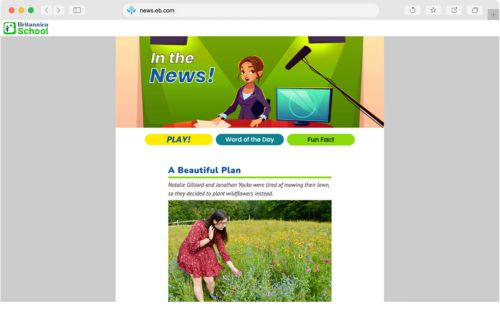
- Spark Discussions: Initiate lively classroom debates with “In the News!” stories. Motivate students to voice their opinions and relate news to their daily lives.
- Critically Analyze: Assign students a news story to dissect further, evaluating its content. Discuss its credibility, uncover potential biases, and consider various perspectives.
- Craft and Showcase: Encourage students to create presentations on their chosen news stories, highlighting their investigative research and analytical thinking.
Britannica School is more than a news source. It’s a gateway to secure, dependable, and all-encompassing education. Experience the benefits of Britannica School today!
#5: Deepen Your Expertise with Media Literacy Workshops
Don’t just teach media literacy; immerse yourself in it. Our expert-led workshops are designed to transform your approach to teaching, offering deep exploration and refinement of literacy skills.
Transform your pedagogical approach by delving into media literacy. Our workshops, steered by experts, are more than learning experiences; they’re your investment in professional advancement and your students’ prosperous futures.
Or, visit the Media Literacy tab of our webinar catalog, where you’ll find recordings of our expert insights to help you stay at the forefront of the ever-changing digital realm.
We’re educators, front and center in the digital age, with a critical mission: navigate the media maze. Our strategies? More than lessons, they’re student power-ups for critical thinking and intelligent decision-making in class and beyond. Media Literacy Week is our wake-up call, spotlighting the need for sharp media consumption. But our gig isn’t a one-week show; it’s a full-time role. Media smarts need a permanent spot in our curriculums and school cultures.
References
- Media Literacy Now. (n.d.). “National Survey Finds Most U.S. Adults Have Not Had Media Literacy Education in High School.” https://medialiteracynow.org/nationalsurvey2022/
- Ali, S. (March 18, 2022). “Media literacy is desperately needed in classrooms around the country, advocates say.” The Hill. https://thehill.com/changing-america/enrichment/education/598795-media-literacy-is-desperately-needed-in-classrooms/
- National Association for Media Literacy Education. (n.d.). “What is Media Literacy Week?” United States Media Literacy Week. https://mlw.namle.org/about/
- Hobbs, R. and Jensen, A. (2009). “The Past, Present, and Future of Media Literacy Education.” Journal of Media Literacy Education, 1-11. https://files.eric.ed.gov/fulltext/EJ1095145.pdf

About the Author
Christopher Heintz
Customer Experience Director
Chris began his career in education as a high school social studies teacher in Chicago. Since then, he’s served in various roles in education management helping teachers navigate the complex world of assessments, data, curriculum, and instruction. Throughout it all, he’s been dedicated to one thing—providing teachers with the tools they need to create positive outcomes for the students in their care!







